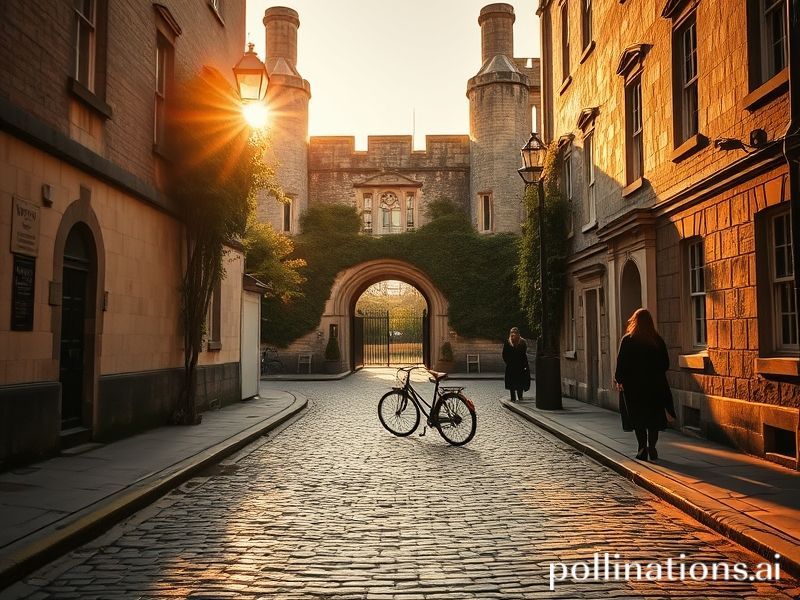Cambridge University: The Medieval Corporation Still Running the Modern World (and Billing You in Latin)
Cambridge, England – Population 145,000, plus roughly 24,000 over-achievers who refuse to leave the library even when the fire alarm sings its mournful hymn. From a safe distance, the University of Cambridge looks like a postcard of medieval stone and manicured lawns; up close it is a planetary sorting hat that still pretends it’s just a provincial college. Every September it siphons the brightest teenagers from 150 countries, promises them “light and sacred draughts,” then gently reminds them their utility bills are due in Latin.
The institution’s global footprint is hard to miss. Its labs gave the world the structure of DNA, the electron, and the algorithm that now decides whether your résumé reaches a human or falls into the digital oubliette. Meanwhile, its graduates populate the upper decks of finance ministries, Silicon Valley boardrooms, and—because no résumé is complete without a little blood sport—various intelligence agencies. If geopolitics were a chessboard, Cambridge alumni would be the pieces arguing about whose turn it is to feel imposter syndrome.
Cambridge’s endowment (£8 billion and counting) is roughly the GDP of Barbados. That comparison is not lost on the Barbadian post-doc on a fixed-term fellowship who teaches thermodynamics by day and calculates the exchange rate of dignity to sterling by night. The university’s wealth, like most fortunes these days, is hedged in land, hedge funds, and the moral high ground. One college recently sold off a 99-year lease on a shopping mall in Leeds, proving that even Gothic fantasies occasionally need cash for a new rowing tank.
The city itself has become a caricature of inequality: medieval courts where Nobel laureates sip claret, ringed by cycle lanes where Deliveroo riders dodge tourists searching for the “real” Hogwarts. A starter home costs 17 times local median income, which works out to about one Dyson per square meter. The university’s answer has been to promise “more affordable housing,” by which it means slightly smaller castles on the edge of town.
Internationally, Cambridge is a brand as much as a place. Beijing parents name their children “Kangqiao” in its honor; Nigerian consultancies promise “the Cambridge mindset” for the low, low price of $299. The university’s online courses—filmed in oak-paneled rooms so atmospheric you can almost smell the damp privilege—have been streamed in 195 countries, proving that aspiration itself is a commodity with excellent margins. Meanwhile, the actual campus still insists on handwritten exams, because nothing says “future-ready” like carpal tunnel.
Of course, Cambridge is not immune to the great unraveling. Brexit trimmed its European research funding like a bored barber; staff now fill out forms in triplicate to justify why French yeast still deserves to be called European. The climate crisis, ever the uninvited guest, floods the meadows every winter, turning punts into gondolas and reminding everyone that even 800-year-old institutions can’t negotiate with physics. And last year, students voted to sever ties with oil companies, forcing the careers service to rebrand BP reps as “energy-transition therapists.”
Yet the machine lumbers on. This week the university announced a new center for “existential risk,” staffed by philosophers, virologists, and—why not—a couple of hedge-fund physicists who owe their souls to Renaissance Technologies. Their mission: prevent human extinction. Their funding: partly from a cryptocurrency billionaire who made his fortune convincing people that digital tulips were the future. The irony, like the port at high table, is served in generous measures.
In the end, Cambridge remains what it has always been—a paradox wrapped in a thesis, hooded in ermine. It is both lighthouse and fun-house mirror for a world that outsources its thinking to algorithms while praying the old magic still works. If civilization collapses, the last tweet will probably be a Cantab correcting the grammar of the apocalypse. And somewhere on the Backs, a goose will honk in agreement, having already achieved tenure.







